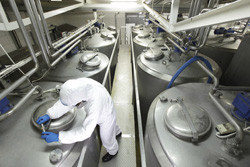Flexible, continuous chemical production
If the process industries within the EU's chemical sector are to strengthen their global technological leadership, they must focus on the three Fs (F3 mode): flexible, fast and future. Achieving these goals was the aim of the 'Flexible, fast and future production processes' (F3 FACTORY)(opens in new window) project, funded by the EU. A key pillar of success was intensification of equipment and processes. Intensification refers to enhancements in performance in a way that is safe, cost effective and energy efficient — basically enhancing performance in a sustainable way. The new factory concepts are based on modular plug-and-produce chemical production technology exploiting three functional elements. These are a generic interface, standardised process equipment containers and process equipment assemblies, and holistic process design exploiting intensification and decision support tools. Effective use of these tools enabled the project team to combine the flexibility of small-scale, multi-product batch plants with the efficiency of continuous world-scale plants. The resulting modular and continuous small-scale chemical plants have proven to be more flexible, economic and robust, easily adapted to the constantly changing process requirements of industrial environments. In addition, they reduce raw material usage and waste. The F3 FACTORY consortium was made up of 26 leading companies and research institutions from 9 EU Member states. Together, they achieved impressive results. Introduction of a new synthetic process was accomplished with a capital cost reduction of up to 40 %, a decrease in energy consumption up to 30 % and an increase in yield up to 20 %. Outcomes resulted in more than 15 patents and 30 publications in peer-reviewed journals, along with 150 conference presentations. Application of the F3 approach across the board in EU chemical plants will have major impact on the competitive position of chemical manufacturing and the economy of Europe. Simultaneously, it will support the chemical industry in more efficiently finding innovative ways to improve Europeans' health, nutrition and well-being.



